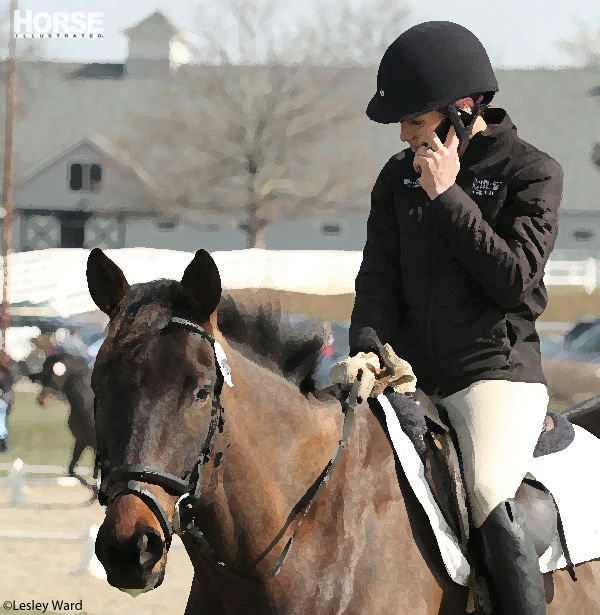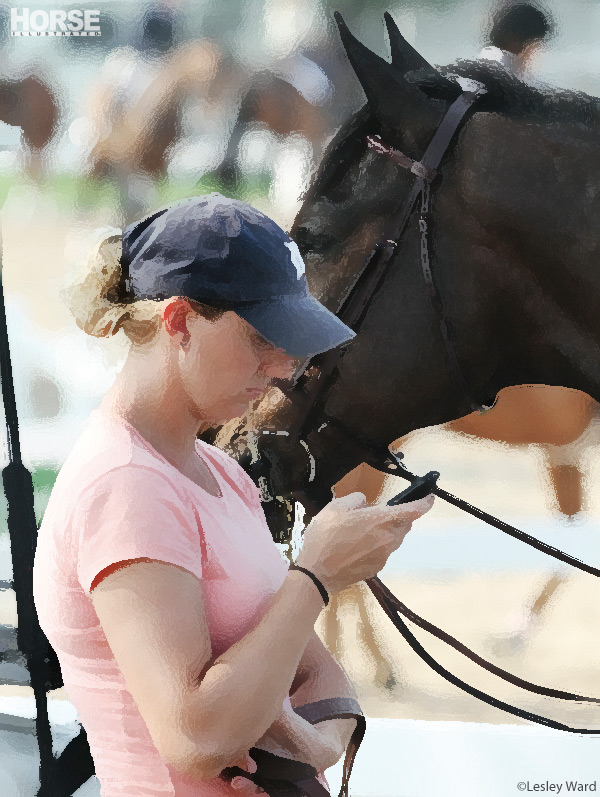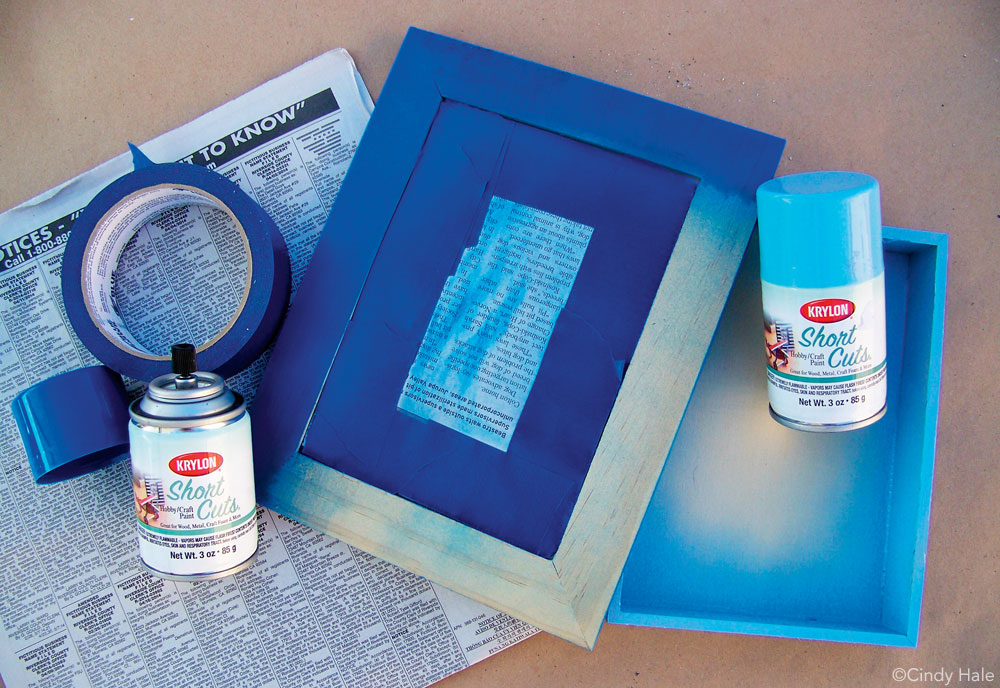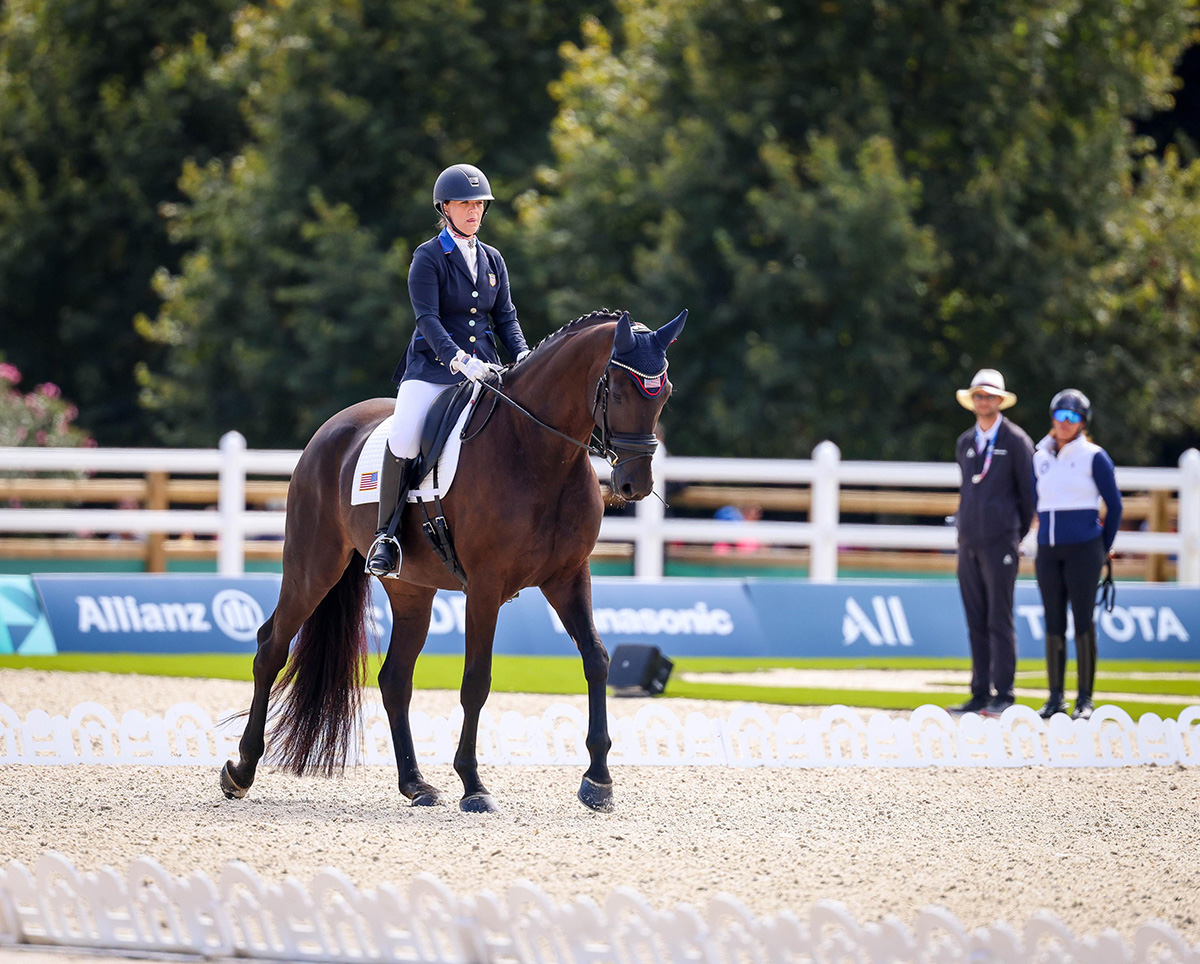
Lisa Habbley was pretty comfortable in her relationship. They had been going steady for some time and she thought she had a good grip on her guy. But Lisa learned the hard way that she was not paying enough attention to him. He dumped her. Literally.
Lisa’s 10-year-old Paint gelding spooked and unseated the distracted rider, who was trotting with a cellphone, hair clip and visor in hand—juggling the three in an effort to check the time and fix her hair. The fall resulted in a broken wrist and a new-found respect for the hazards of multitasking while on horseback. Shifting your focus from posting at the trot to posting a message on Facebook is not only a threat to your safety, but it also threatens your relationship with your horse.
No matter how harmless multitasking may seem, it’s distracting. According to research conducted by Carnegie Mellon University in Pennsylvania, supported by the U.S. Department of Transportation, 37 percent of brain activity devoted to the task of driving is lost while simultaneously using a cellphone. That loss of attention can relate to riding as well. If you’re texting while trotting, what messages are you sending your horse? He deserves your focus and attention, whether you’re training for competition, heading out on a trail, or just riding around the farm.
R U There?
Consider how your cellphone interruptions can affect your relationship. After 17 years of marriage, world-renowned natural horsemanship trainers and clinicians Linda and Pat Parelli seem to have things figured out. But Linda admits that any relationship requires work on communication, respect, intimacy and friendship. When it comes to the bond between you and your horse, she says, “He has to know that you wouldn’t rather be anywhere else when you’re together.”
Dinner with your sweetheart should not be interrupted by a buzzing phone and constant screen checking. The same thing goes for you and your horse, who also needs your full attention. Linda advises that you only check your phone before and after your training session.
“Getting distracted by your phone interrupts the flow of communication with your horse, just like having a conversation with a friend and suddenly making a phone call or text more important,” explains Linda, emphasizing that giving your horse your full attention means you’re better able to read him and respond to his needs.
Linda says the Parelli Natural Horsemanship program encourages relationships based on mutual trust, respect and communication. To build that type of relationship with your horse, you have to make him a priority and keep your focus on him.
“Not many people can multitask around horses and stay safe,” Linda says.
However, having your phone handy has its advantages. Dan Grunewald, a featured clinician at the 2010 Alltech FEI World Equestrian Games and four-time top finisher in the Extreme Mustang Challenge, suggests you keep your phone with you to be able to call for help if you find yourself in a dangerous situation. As an emergency medical technician, Grunewald has experienced first-hand the benefits of having quick access to a phone to call for help. Four years ago, his mom, Karen, was severely injured in a riding accident.
“In that situation, it was good to have my phone, and also good to know medical skills to help her,” Grunewald explains.
Like many other riders, Grunewald admits he is guilty of talking on the phone while riding. He warns, though, that if you decide to use your phone while on your horse, you should either stop or at least be on a well-trained and trusting mount.
In addition, riding with a cellphone in hand or pinned between your shoulder and ear puts you out of position and causes you to send incorrect cues to your horse. Inconsistent cues can interrupt your training program.
As Grunewald suggests, stopping to answer a call is a safer option. But this plan can cause confusion for your horse. While training, Grunewald will get up to five or six calls per horse.
“Every time that phone rings, it seems like I’ll be trotting and then I’ll stop. Then I’ll lope. Phone rings again. Stop. Pretty soon that horse won’t know if you want to go or stop.” If your horse grows accustomed to this procedure, you will eventually and unintentionally have conditioned him to respond to your ringtone by stopping.
Try to train yourself too. If you get a call or text, don’t immediately reach for the phone. Make sure you choose an appropriate stopping point, where your horse is focused and responsive, and then transition to a halt before answering.
You may be tempted to reach for that phone as you’re still gliding to a halt, but don’t do it. Grunewald cautions that your sudden movements to retrieve your phone may startle your horse and provoke a buck.
“Horses have a fight-or-flight instinct in them and they’re either going to do one or the other,” Grunewald warns. “If you’re not fully in tune and on the same page with that horse, he is going to tell you.”
GR8 Ideas
Avoiding conflict in a relationship is ideal, but oftentimes the most likely outcome is a compromise. Instead of leaving electronics behind at the barn, trainers TJ Clibborn and Tracy Porter actually incorporate phones, cameras and video recorders into their training programs to gauge their horses’ progress. However, it’s not just the horse that needs to have experience with distractions.
“If you’re not in a position where you’re aware of what little things your horse is doing, then it can be a huge detriment to your horse,” Porter explains, warning that it can also be dangerous for you.
As a former videographer for several television stations, Porter’s feel for the camera is second nature. “I think that’s probably why it is easier for me to
while riding,” she says, adding that she’s even ridden Extreme Cowboy courses while videotaping from the horse’s point of view.

TTYL
If you’re teaching upper-level techniques, Porter says you can’t be on the phone and train at the same time.
When using a phone while riding, Clibborn brings his horse back down to a walk. The 2011 America’s Favorite Trail Horse finalist says you should offer “soaking time” to your horse throughout his training. Using your phone during this resting time is perfectly acceptable, as long as you still remain aware. “It gives your horse time to think,” Clibborn explains. “He can have a little bit of time to soak in what you were teaching him before the phone rang.”
However, when starting young or green horses, it’s especially important to know when to turn off the phone. Call up trainer Mark Burnette and you’ll hear, “Hi, this is Mark Burnette. I am unable to answer my phone at this time because I am giving this 2-year-old the first ride of his life, and if I answer my phone, this 2-year-old will give me the last ride of my life.” The veteran Mustang trainer knows the importance of staying connected with his horse.
Dropped Call
While your phone helps you connect with people, Porter points out that some people are actually losing touch.
“I think the biggest drawback is that the more our society gets electronically dependent, the more people lose interpersonal skills, as well as their ability to be able to read what animals need and what they’re trying to say to us,” she explains. “I think people lose sight of that creativity and that communication with their horses.”
Just as we strive for having fulfilling relationships with the humans in our lives, we should also take the time to cultivate meaningful relationships with our horses. Establish open lines of communication, demonstrate respect, and nurture intimacy and friendship. No doubt that as your bond grows, you’ll make some lasting memories together. Chronicle these memories by having someone take pictures of you two on your phone. Then hit the silent button, tuck the phone away in your pocket and enjoy your ride.
Liked this article? Here are others you’ll love:
Trail Riding Etiquette
Show Ring Spectator Etiquette
This article originally appeared in the October 2013 issue of Horse Illustrated. Click here to subscribe!





whats up with the pics, they look like water color or oil paintings?!?!!?
Cell phone should be turned off, and enjoy the ride.
I always have my cell phone and camera with me when I ride. I don’t text or check messages but I’ll certainly answer the phone if it rings. I also take tons of photos and video. But, I make sure that my priority is my riding or driving, if I lose concentration it’s on my photography.
Yeah, the pictures do look like water colour paintings. However, interesting article 🙂
Common sense should be thought, that pay attention to your horse first. Cell phone should not be used unless really needed.
The photos were edited or something with a filter to make them look like that..
As for the texting while trotting -no rider should ever use his/her cell phone unless it’s an emergency. I keep mine with me and put it on silent or vibrate. I only use it to check the time and have it with me in case of emergencies.
I guess everyone should get gaited horses that don’t trot 😉
when I ride I never answer my cell pohone the only reason I take it is for an emergency that I hope will never happen. I think it is a disservice to yourself and the horse and nature that you are or should be enjoying. Taking the stress out of my life is what my Trail Rides are all about… and cell phones have NO PART in that
I never text, talk on the phone, or listen to music with headphones while riding. For one thing, it’s unsafe. Plus, it’s just rude to your horse! Don’t expect him to listen if you aren’t paying attention.
irocknride.com